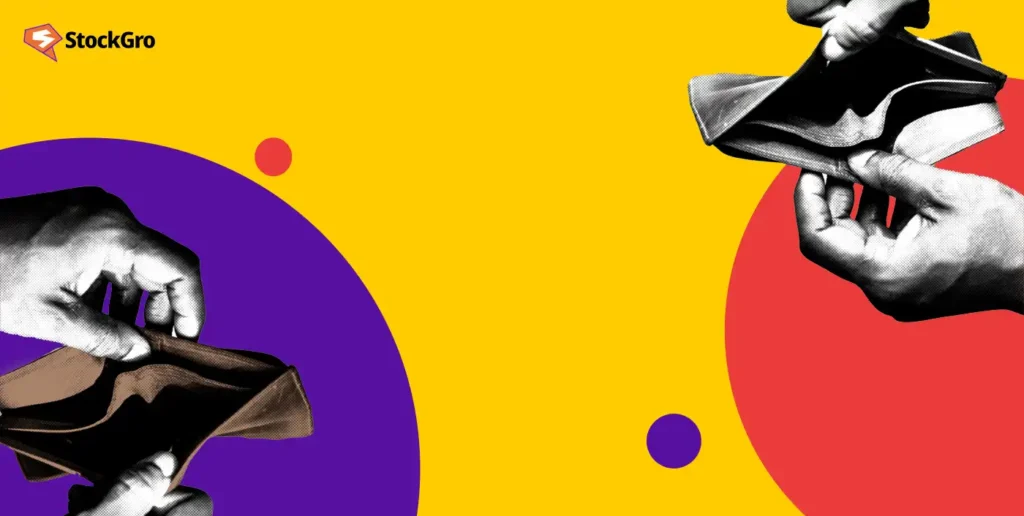
Inflation is a common concept in economic conversations. However, its relevance to personal finances is often disregarded. In essence, inflation denotes a broad elevation in the costs of goods and services over time, leading to a reduction in the buying power of currency. This blog endeavours to clarify the influence of inflation on personal financial matters and present practical approaches to alleviate its consequences. Without further delay, let’s delve into the details on inflation effects on personal finances followed by tips for navigating inflation in personal finance.
Effects of inflation on personal finance
Decreased purchasing power
One of the most noticeable inflation effects on personal finances is the gradual erosion of our money’s purchasing power. As inflation increases, the worth of currency declines, necessitating larger amounts of money to buy the same goods and services. This ultimately reduces consumer price index (cpi) and personal finances.
Increased costs
The impact of inflation is deeply felt in everyday spending. Essential items such as food, housing, and transportation steadily become pricier, requiring a greater portion of your income to meet these fundamental needs. As the cost of living escalates, managing economic inflation and personal budgeting becomes more difficult, posing challenges in saving for future objectives.
Reduced savings and retirement funds
Inflation can also diminish the worth of your savings and retirement accounts. Picture this: after years of careful saving for retirement, you discover that upon retirement, the buying power of your nest egg has markedly declined. If your investments fail to keep up with or surpass inflation, there could be significant inflation impact on savings.
To reduce inflation impact on savings and retirement funds from inflationary effects, contemplate diversifying your investment portfolio and consulting financial experts who can assist you in selecting investments that match your financial aspirations and risk tolerance.
You may also like: Creating multiple streams of income
Increased borrowing costs
Inflation doesn’t solely influence your savings; it can also affect your borrowing expenses. When inflation escalates, central banks frequently respond by raising interest rates to manage it. Elevated interest rates translate to increased costs for loans like mortgages and personal loans. If you have variable-rate loans, your monthly payments may substantially rise, adding pressure to your budgeting in times of inflation.
To alleviate the effects of escalating borrowing expenses, you might contemplate securing fixed-rate loans when interest rates are comparatively low. This can furnish you with stability and predictability in your monthly payments, shielding you from inflation-driven interest rate hikes.
Retirement planning
The influence of inflation and retirement planning is significant. With increasing prices, the purchasing power of the same retirement savings diminishes, posing challenges in sustaining one’s desired lifestyle during retirement. To address this concern, it becomes imperative to pursue diversified investments in stocks, bonds, and alternative assets capable of generating returns surpassing inflation rates. This strategy is fundamental for ensuring long-term financial security.
Government response
Government policies wield influence over inflation. Central banks might opt to increase interest rates as a measure to counter inflation, consequently elevating borrowing expenses for both individuals and businesses. Meanwhile, initiatives like price controls can instigate shortages of goods and services, adversely affecting both the economy and personal finances.
Also Read: Balancing a full-time job and a side hustle
Impact on debt
Though inflation may bring long-term effects of inflation on wealth, it can also prove advantageous for individuals in debt. For those who have borrowed at a fixed interest rate, inflation effectively diminishes the actual value of their debt as time progresses. With increasing wages and prices, the relative weight of the debt lessens. Nonetheless, this situation is more advantageous for borrowers with fixed-rate loans as opposed to variable-rate loans.
Housing and loan affordability
Inflation can impact both the housing market and the accessibility of loans. As the cost of living rises, so does the price of houses and real estate, presenting greater obstacles for individuals looking to enter the housing market or upgrade their residences. Furthermore, if inflation triggers higher interest rates, it can elevate the cost of loans, potentially constraining borrowing capabilities or escalating the expense of existing loans.
Managing the impact of inflation
Considering that inflation is unavoidable, there are still steps you can take to alleviate the impact of escalating prices of goods and services. Here are some suggestions on managing finances during inflation:
Plan ahead
To effectively managing finances during inflation, it’s essential to develop a strategic financial plan. Begin by outlining both your present and future expenses. Create budgeting in times of inflation that accounts for these expenses and commit to adhering to it. By doing so, you can mitigate the risk of overspending and impulse purchases.
Increase your cash flow
Explore opportunities to bolster your income with strategies for protecting finances from inflation. The greater the number of income sources you have, the more assured you’ll be in covering your expenses adequately. Consider pursuing part-time employment or engaging in online freelance work. Alternatively, starting your own business or pursuing a sideline venture can also augment your cash flow.
Reduce your expenses
It is a great technique of hedging against inflation in personal investments. Review your budget carefully and discern whether an expense pertains to a necessity or a desire. Depending on your financial resources, strike a suitable equilibrium between fulfilling your wants and addressing your needs. If you find yourself on a tight budget, prioritise fulfilling your essential needs. Demonstrating discipline and embracing frugality can go a long way in managing your finances effectively.
Also Read: Passive income ideas for financial freedom
Start investing
This is a great way of coping with inflation in personal finance. If you possess savings or surplus disposable inflation-adjusted income, you might contemplate investing in financial instruments capable of yielding returns surpassing the inflation rate. Consulting with a financial advisor is advisable to identify inflation and investments opportunities that align with your financial capabilities and risk tolerance.
Diversify your portfolio
Maintaining a diversified portfolio across various asset classes can mitigate inflation risk by distributing investments across sectors that thrive in diverse economic environments. Diversification not only diminishes overall portfolio risk but also has the potential to enhance returns.
Avoid concentration in any one sector
You run a serious danger of experiencing inflation if you restrict your money in one area. Investing just in technology stocks, for instance, may yield fantastic profits during a tech boom but might incur large losses during a market slump. You may spread out your risk and guard against the effect of inflation on any one industry by spreading your assets across a number of different industries.
Negotiate prices
One of the simplest strategies to defend against the effects of inflation is to negotiate pricing. Many goods and services have flexible rates, particularly those in the service industry, such as cable and internet providers, insurance firms, and healthcare providers. Negotiating pricing allows you to possibly save money on costs while also offsetting the effects of inflation.
Minimise debt
Inflation can also have an effect on debt since the value of money decreases with time, making it more difficult to repay debts. High amounts of debt can become more onerous when inflation rises, especially if the interest rate on the loan is fixed. By reducing your debt, you may lower your exposure to inflation risk and increase your financial flexibility.
Final Words
Both nostalgia and inflation may have had such an impact on you that you are spending too much time reminiscing about the good old days when you could do more with less money. We can’t turn back time, but the good news is that by practising prudent spending habits, you can deal with inflation.
It is more appealing to take action to combat inflation risks and financial planning now that you understand that it affects not just your current spending power but also your ability to plan for a more pleasant and worry-free future.

